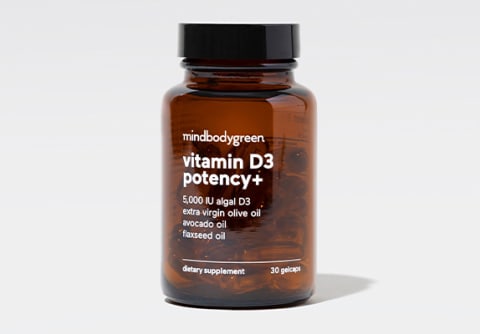Advertisement
Vitamin D Absorption In The Gut Is *Not* Guaranteed: 4 Tips To Help


Ashley Jordan Ferira, Ph.D., RDN is Vice President of Scientific Affairs at mindbodygreen. She received her bachelor's degree in Biological Basis of Behavior from the University of Pennsylvania and Ph.D. in Foods and Nutrition from the University of Georgia.

Over 90% of American adults1 are struggling to consume adequate levels of vitamin D from their diet, and less-than-ideal gut health might be further inhibiting your ability to absorb this essential nutrient. Luckily, there are some concrete tips that can help you enhance your gut microbiome and vitamin D absorption so you can be cruising at healthy, sufficient levels in no time.* (Of course, assuming you're consuming adequate amounts of the nutrient.)
Gut health and nutrient absorption.
When we discuss the gut, we're primarily talking about the small intestine, where 90% of food is absorbed2. The quality of health in the gut is dependent on the microbiota (aka gut flora), which is made up of microscopic organisms (e.g., bacteria, viruses, and fungi) living in the intestines. Healthy gut flora—often called "good bacteria"—help with digestion, support immune function, and are even linked to cognitive function and mood.
For proper nutrient absorption, a healthy gut needs microbial diversity, a healthy intestinal lining (which, by the way, vitamin D plays a key role in supporting immune function of the gut mucosa3), and the right conditions or buddy nutrients (e.g., some fat for fat-soluble nutrients like vitamin D!).
The link between vitamin D and gut health.
Considering their shared activities—such as providing support to the immune system, assisting in nutrient absorption (specifically calcium and phosphorus, in the case of vitamin D)—it's no surprise that vitamin D and the gut have been intrinsically linked in research over the last decade.*
Abundant and diverse gut microbiota are the sign of a healthy gut that is able to properly absorb micronutrients (including vitamin D), and recent studies reveal nutritional inadequacies likely affect the gut microbiome4 and the gut's ability to function properly.*
A 2016 study published in Frontiers5 indicates that vitamin D deficiency (which affects 29% of the U.S. adult population6) is associated with gut bacteria disruption, such that sufficient levels of vitamin D may improve gut health (and vice versa).*
4 ways to optimize vitamin D absorption.
Now that you know how intertwined vitamin D and the gut are, you might be wondering how to support your gut health in order to improve your vitamin D absorption. This is a two-pronged issue: Gut health is a priority so micronutrients can be properly absorbed, but adequate levels of vitamin D are also required daily (Learn how much vitamin D you truly need here):
1. Diversify your diet with fiber-rich foods.
The gastrointestinal microbial habitat contains about 300 to 500 species of microorganisms7. That's a lot of tiny bugs to keep fed and happy! The easiest way to do it? Eat lots of different types of nutrient-dense foods that provide fiber—especially fruits, vegetables, legumes, seeds, etc. The prebiotic variety of fiber is your gut bugs' favorite type to consume. Additionally, cooked foods are often easier for the gut to digest and can further support your gut health.
2. Take your vitamin D with a healthy fat.
Vitamin D is absorbed 32% better8 when eaten with a fat source (like a built-in organic oil trio of olives, avocados, and flaxseed, in the case of vitamin D3 potency+).* Vitamin D is fat-soluble, which is why health care professionals often recommend you take a D supplement with a meal. It's also important to point out that the vitamin D3 variety (instead of D2) is superior in terms of bioavailability and bioefficacy in the body.*
3. Elevate and diversify your gut microbiota with a high-quality probiotic.
Regularly replenishing your gut microbiota with probiotic strains will help promote diverse functions (i.e., digestion, absorption, motility, regularity, etc.) of your gastrointestinal tract.* To get the most out of your probiotic, choose one that contains science-backed doses (i.e., typically billions) of organisms and targeted strains (like mbg's probiotic+).*
4. Get ample magnesium.
Sufficient magnesium levels are essential to properly transport and activate vitamin D. "Suboptimal magnesium status is relevant to vitamin D because the mineral is required for binding 25(OH)D to the vitamin D binding protein (VDP) for circulation around the blood and delivery to tissues throughout the body," mbg vice president of scientific affairs Ashley Jordan Ferira, Ph.D., RDN, explained in a previous article. "Magnesium is also required for the conversion of 25(OH)D to the active 1,25(OH)2D hormone form. Both of these mechanisms will affect vitamin D status," she concludes.
The takeaway.
With 93% of Americans1 missing the mark on daily vitamin D intake, we could all benefit from extra gastrointestinal support to ensure we get the most out of our vitamin D supplementation.* To knock one item off the list, take a sustainably sourced vitamin D3 supplement with premium built-in oils (i.e., absorption technology) so you don't have to stress about working your vitamin routine around your meal schedule.*
8 Sources
- https://www.ncbi.nlm.nih.gov/labs/pmc/articles/PMC5579642/
- https://www.ncbi.nlm.nih.gov/books/NBK537103/
- https://www.ncbi.nlm.nih.gov/labs/pmc/articles/PMC2955835/
- https://www.ncbi.nlm.nih.gov/labs/pmc/articles/PMC5524138/
- https://www.frontiersin.org/articles/10.3389/fphys.2016.00498/full
- https://www.cambridge.org/core/journals/british-journal-of-nutrition/article/vitamin-d-deficiency-and-insufficiency-among-us-adults-prevalence-predictors-and-clinical-implications/44E436843510FE6BDE856D5BCB9C651F
- https://www.ncbi.nlm.nih.gov/labs/pmc/articles/PMC3983973/
- https://pubmed.ncbi.nlm.nih.gov/25441954/
Watch Next
Enjoy some of our favorite clips from classes
Enjoy some of our favorite clips from classes
What Is Meditation?
Mindfulness/Spirituality | Light Watkins
Box Breathing
Mindfulness/Spirituality | Gwen Dittmar
What Breathwork Can Address
Mindfulness/Spirituality | Gwen Dittmar
The 8 Limbs of Yoga - What is Asana?
Yoga | Caley Alyssa
Two Standing Postures to Open Up Tight Hips
Yoga | Caley Alyssa
How Plants Can Optimize Athletic Performance
Nutrition | Rich Roll
What to Eat Before a Workout
Nutrition | Rich Roll
How Ayurveda Helps Us Navigate Modern Life
Nutrition | Sahara Rose
Messages About Love & Relationships
Love & Relationships | Esther Perel
Love Languages
Love & Relationships | Esther Perel
What Is Meditation?
Box Breathing
What Breathwork Can Address
The 8 Limbs of Yoga - What is Asana?
Two Standing Postures to Open Up Tight Hips
How Plants Can Optimize Athletic Performance
What to Eat Before a Workout
How Ayurveda Helps Us Navigate Modern Life
Messages About Love & Relationships
Love Languages
Advertisement

What Men Are Getting Wrong About Mental Health, From A Psychologist
Stephen B. Poulter, PhD

Your Grandma's Go-To Supplement Is Once Again Popular (For A Good Reason)
Molly Knudsen, M.S., RDN

What Men Are Getting Wrong About Mental Health, From A Psychologist
Stephen B. Poulter, PhD

Your Grandma's Go-To Supplement Is Once Again Popular (For A Good Reason)
Molly Knudsen, M.S., RDN














